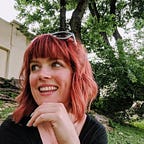R4DS: Learning to Learn
Background
It took me eight years to finish my undergraduate degree, not because I took a lot of time off to volunteer or travel the world, but because I dropped out twice (twice!) due to never having learned to learn in my K-12 days.
Looking at my academic performance in high school, I wasn’t the kid you would think would struggle with college. But if you scratched beneath the surface of the good grades, you’d see a student who put in very little effort beyond generally paying attention in class and completing homework assignments. It turns out that this strategy doesn’t necessarily fly in higher education.
It wasn’t until my third attempt at a Bachelor’s degree that I had an educator point out that learning could be a long process filled with a lot of mistakes, and just because you didn’t get it right away didn’t mean that you couldn’t or wouldn’t get it. Even then, it wasn’t until graduate school that I learned that I am an incredibly slow learner — something I still struggle with to this day.
So what?
If you’re a learner in the “R for Data Science” online learning community, I imagine that opening Slack and seeing:
- the dizzying depth and breadth of expertise of the community…
- the seemingly unending scores of people who seem to know all the things…
- the non-stop stream of words like Jupyter, RMarkdown, class, function, Project and notebook…
- people producing actual code already…
… can be daunting, overwhelming, panic-inducing, and downright terrifying.
I know that more than one of you has already looked at the group and said “Nope. I’m out. I’ll never catch up/be this good/be this smart. I’m going to look stupid if I ask a question and then everyone will know I’m stupid and can’t learn R and maybe I should just give up on being a data analyst forever and ever because I will never, ever get this. Besides, I’m really busy with my not-so-satisfying day job anyway.”
You know how I know that’s what you’re thinking? Because I’ve felt the exact same way. In fact, I feel this way a lot, because learning can be challenging.
What to do about it
- Take a deep breath — every single person has had to learn something new and difficult before, and they’ve lived to tell the tale.
- Turn off all of the notifications for Slack, and instead set aside 10 — 20 minutes a day to browse through things that interest you.
- You don’t have to read every message! Heck, use the search function to target conversations specific to the things you’re interested in.
- Focus only on the channel for the weekly content — ignore everything else.
- Know that you’re not going to learn everything in the book on this first pass through the material, and that’s OK! You’re probably not even going to learn most of the things in this text, and that’s still OK! What matters is that you know what’s in the text, so that when you encounter a problem a few weeks or months from now, you know where to go find the answer.
- When examples are presented in the text, type them out yourself in RStudio and see if you can get the exact same answers. If your code doesn’t work, or gives a different answer, start by looking for typos. Typos are the source of many a programmer’s nightmares.
- Get comfortable being uncomfortable. You’re in a safe, supportive group with people who genuinely want you to learn. So make mistakes, and share those mistakes with others, so that you can learn how to fix them on your own.
- If you spend more than 10 minutes working on a problem in the text, it’s time to ask for help in the weekly content channel. If that’s too stressful, send me a message and I’ll find someone who can work with you outside of the main channel.
- Be responsible for your own learning. There’s nowhere to post your completed work, and there’s no one keeping track of whether or not you did the content for the week. You will get out of this experience exactly what you put into it.
And if you’re interested in more resources on learning how to learn, I recommend the following starting points:
- Learning to Learn article from the Harvard Business Review
- Learning to Learn: You, Too, Can Rewire Your Brain article from the New York Times
- Learning How to Learn Coursera Course (approximately 3 hours, audit at no cost)
